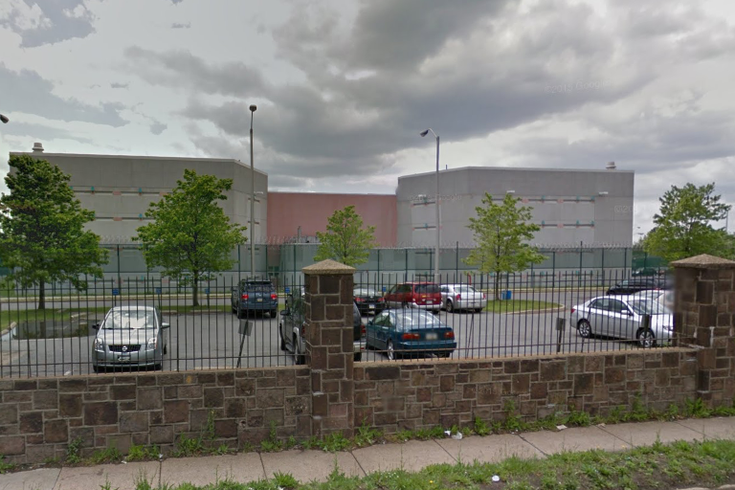
September 09, 2015
 Google Maps/Street View
Google Maps/Street View
The Curran-Fromhold Correctional Facility in Northeast Philadelphia.
Four current and two former guards at Philadelphia-area prisons were indicted Wednesday on charges they attempted to smuggle OxyContin and, in some cases, a cellphone to prisoners for cash.
According to U.S. Attorney Zane Memeger, who announced the indictments during an afternoon press conference, the guards met outside the prison walls with associates of various prisoners working alongside federal investigators during a sting operation. The guards allegedly accepted cash payments ranging from $500 to $1,500 to pass contraband drugs and cellphones past security during the undercover operation.
"These indictments are the results of lengthy and thorough investigations sought by the Philadelphia prisons to address a growing number of contraband seizures in our jails," FBI Special Agent-In-Charge William F. Sweeney Jr. said. "We hope the message is clear: the Philadelphia prison system will have no place for staff who use their power and their position to engage in criminal acts."
Authorities identified the current prison guards, all from Philadelphia, as John Wesley Herder, 49, who works at the Curran-Fromhold Correctional Facility, Bryant Fields, 43, who works at the The Detention Center, George Kindle, 29, who works the House of Corrections and Joseph Romano, 31, who once worked at the Philadelphia Industrial Correction Center and is currently employed at the Riverside Correctional Facility.
The former prison guards were identified as Marc Thompson, 23, who worked at The House of Corrections and Dupree Myers, 27, who was assigned to Curran-Fromhold.
If convicted, the men face maximum prison sentences ranging from 40 to 80 years. However, Memeger said the defendants likely would receive sentences of three or four years, given statutory guidelines.
Philadelphia Prisons Commissioner Louis Giorla requested a federal sting operation after seeing a heightened amount of contraband seized within prison facilities.
"In any correctional facility, there's always a level of contraband that exists, whether it's minor or major," Giorla said. "We believe that several of employees were engaged in this activity for some time. Many of them are veterans — one as long as nine years on the job. We don't know how deep the activity was, but after seizing street drugs in our facilities and cell phones, we knew that we needed assistance."
Investigators do not believe the prison guards were acting in an organized effort, Giorla said. He did not know how the guards got the contraband, which used placebo drugs masked as OxyContin, to the inmates.
"That will come forth in the trial evidence," Giorla said. "In correctional facilities, people throw Frisbees over yard fences. People put them in packages in the mail. Anything that comes through the door, there's a way."
The prison system is working to expand its investigative capabilities by boosting surveillance cameras, Giorla said. The indictments should serve as a warning to other guards possibly engaged in smuggling contraband into prisons.
"To any officers who are considering this type of activity, I would recommend that they refrain from it," Giorla said. "To anybody who may be engaged in this at this time, you'll be next."
Cell phones are considered contraband because prison workers cannot control or monitor conversations. With such access, inmates can transfer witnesses, intimidate witnesses or further criminal enterprises.
Herder allegedly agreed to supply a Curran-Fromhold prisoner with 100 OxyContin pills and a Nokia cellphone in exchange for $1,000 on Oct. 29, 2013. He also was charged with making false statements to law enforcement officers. He faces a maximum prison sentence of 45 years.
Kindle allegedly twice agreed to deliver 100 OxyContin pills and a cellphone to an inmate at The House of Corrections. He allegedly accepted $1,000 on both occasions — Oct. 11, 2013 and Nov. 15, 2013. He faces a maximum prison sentence of 80 years.
Thompson allegedly delivered 100 OxyContin pills and a Blackberry cellphone to an inmate at The House of Corrections for $1,500 on Sept. 16, 2013.
Fields allegedly delivered 50 OxyContin pills to an inmate at The Detention Center for $500 on March 10, 2014.
Romano allegedly delivered 100 OxyContin pills to an inmate at Philadelphia Industrial for $1,000 on July 29, 2014.
Myers allegedly delivered at least 71 OxyContin pills and an LG cellphone to an inmate at Curran-Fromhold inmate between Dec. 22, 2014 and Dec. 29, 2014.
Thompson, Fields, Romano and Myers each face maximum prison sentences of 40 years.